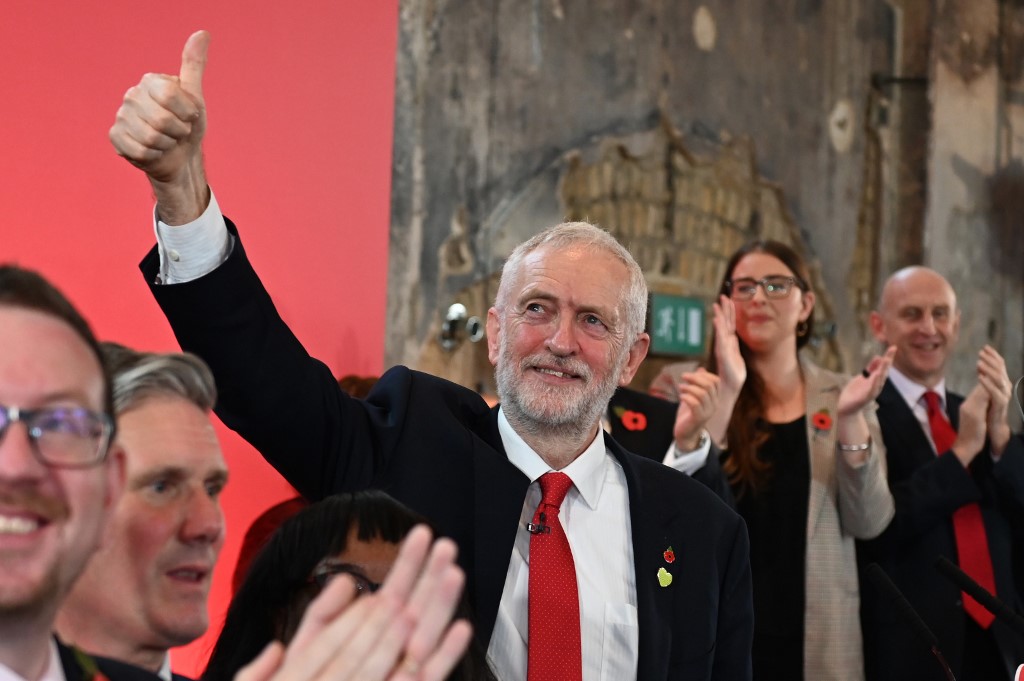The next six weeks could shape Britain's destiny for decades

It is the most significant general election in more than a century; the result will determine the destiny of the UK for decades to come.
There are just six weeks to go until the British people go to the polls on 12 December.
A victory for Boris Johnson’s Conservative Party would mean that Britain would leave the EU within months, turning away from Europe and towards the US. The UK itself may then break up as pressure builds for a united Ireland and Scottish independence.
Renegotiating Brexit
In sharp contrast, Labour leader Jeremy Corbyn is promising to renegotiate a “softer” deal with Europe and put the result to a referendum. But his influence would be felt in other ways, affecting the most dramatic change in British economic policy since Maggie Thatcher 40 years ago. She led Britain and the world towards neoliberalism.
New MEE newsletter: Jerusalem Dispatch
Sign up to get the latest insights and analysis on Israel-Palestine, alongside Turkey Unpacked and other MEE newsletters
Corbyn would try to reverse Thatcher. He has pledged to bring back the social democratic economic and social structures that defined much of western Europe when he was a young socialist. This would include seizing up to 10 percent of the shares in big companies and giving them to workers, and renationalising key industries. Some of his policies, such as renationalisation of rail, are more popular than critics realise.
Under Johnson, the Conservative Party has converted itself into something uncomfortably close to an English nationalist party
Corbyn is not - repeat, not - a communist as his enemies assert. But he is certainly promising substantial redistribution of wealth from rich to poor, and from employer to employee. He also promises to fundamentally change the pattern of British foreign policy by re-examining the longstanding alliance with the US.
Corbyn’s chances of victory are low. His divided Labour Party hovers around 10 points below the Tories in most polls. This means that Johnson is favoured to win an outright majority, which would put him in power for five years - and give him the mandate he craves to take Britain out of the EU.
Tactical voting
Yet, the Brexit factor makes this a difficult election to predict. Some will likely vote for tactical reasons, to help engineer their favoured outcome. Party affiliations are loose. British politics is being reshaped before our eyes.
The Liberal Democrats look certain to put on a strong performance as an unequivocally Remain political party. The Scottish National Party will likely wipe out Tory seats north of the border.
Britain’s senior pollster, Sir John Curtice, believes “the safest prediction” is that there will be a record number of non-Conservative and non-Labour MPs elected.
With so much at stake, I am afraid we are facing the most vicious campaign in modern history.
Large parts of Johnson’s Tory Party appear to have fallen into the hands of the Vote Leave campaign, which misled the British public and broke electoral law in 2016. The campaign notoriously claimed that the UK sent the EU £350m ($453m) a week when the real figure, after a rebate is taken into account, is closer to £267m a week.
The anti-Muslim card
Another lie came in the form of a poster that said: “Turkey, population 76 million, is joining the EU.” Three years on, and Turkey is yet to join the EU and doesn’t look close to doing so.
The campaign was also fined £61,000 ($79,000) by the Electoral Commission for breaching spending limits.
Expect more of the same. Corbyn will will be portrayed as an antisemite and a Marxist hell-bent on the destruction of Britain.
If past history is anything to go by, Johnson’s Tories may play the anti-Muslim card, exploiting fears of Islam and mass immigration to win votes. There was early evidence of this in a recent edition of Spectator magazine, which carried a piece by the notoriously bigoted columnist Rod Liddle, calling for Muslims to be denied the opportunity to vote.
The Tories will project themselves as a moderate centrist party, compared with Corbyn’s far-left Labour. This is misleading.
Under Johnson, the Conservative Party has converted itself into something uncomfortably close to an English nationalist party. It’s launched a series of ugly attacks on parliamentary democracy and the rule of law.
Divided opposition
This is one reason why we’ve seen the departure of so many traditional Conservatives, including Amber Rudd, Ken Clarke, Rory Stewart, Philip Hammond, Dominic Grieve, Oliver Letwin, Justine Greening and more.
The best way to fight Johnson's Tories would be via an electoral pact between Labour and the Liberal Democrats
The One Nation Tory Party is no more. The hard right has won the internal Tory battle. Can it now win an election? The signs are that it can.
This is partly because the opposition is divided. The best way to fight Johnson’s Tories would be via an electoral pact between Labour and the Liberal Democrats.
Neither Corbyn nor Liberal Democrat leader Jo Swinson will countenance such an arrangement. Meanwhile, Johnson faces his own threat from the Brexit Party to the right.
These are unsettling, dangerous times. But Britain has a magnificent history of democracy, freedom, decency, tolerance and support for the underdog. It’s time to draw on that.
The views expressed in this article belong to the author and do not necessarily reflect the editorial policy of Middle East Eye.
Middle East Eye delivers independent and unrivalled coverage and analysis of the Middle East, North Africa and beyond. To learn more about republishing this content and the associated fees, please fill out this form. More about MEE can be found here.







